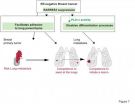(Press-News.org) A new treatment for drug-resistant epilepsy with the potential to suppress seizures 'on demand' with a pill, similar to how you might take painkillers when you feel a headache coming on, has been developed by UCL (University College London) researchers funded by the Wellcome Trust.
The treatment, described in Nature Communications, combines genetic and chemical approaches to suppress seizures without disrupting normal brain function. The technique was demonstrated in rodents but in future we could see people controlling seizures on-demand with a simple pill.
Epilepsy affects around 50 million people worldwide including 600,000 in the UK and around a quarter of cases are resistant to conventional treatments. Many of these cases could be addressed by the new treatment method, which relies on genetic modification of brain cells to make them sensitive to a normally inactive compound.
"First, we inject a modified virus into the area of the brain where seizures arise," explains Professor Dimitri Kullmann of the UCL Institute of Neurology, senior author of the research. "This virus instructs the brain cells to make a protein that is activated by CNO (clozapine-N-oxide), a compound that can be taken as a pill. The activated protein then suppresses the over-excitable brain cells that trigger seizures, but only in the presence of CNO.
"At the moment, severe seizures are treated with drugs that suppress the excitability of all brain cells, and patients therefore experience side effects. Sometimes the dose required to stop seizures is so high that patients need to be sedated and taken to intensive care. If we can take our new method into the clinic, which we hope to do within the next decade, we could treat patients who are susceptible to severe seizures with a one-off injection of the modified virus, and then use CNO only when needed.
"CNO would be given as a pill in the event that patients could predict when seizures were likely to occur. For example, many people with treatment-resistant epilepsy experience clusters of seizures, where severe seizures are preceded by smaller ones. Seizure risk is also high when people are ill, sleep deprived, or at certain times of the menstrual cycle, so these would all be good times to take the pill as a preventative measure. In urgent situations, the compound could be given as an injection. We could even consider a fully automatic delivery system, where CNO was given by a pump, as is done for insulin in some people with diabetes."
As CNO has a half-life of about a few hours and only affects the pre-treated epileptic parts of the brain, the new method avoids the need to permanently alter the brain or treat the whole brain with seizure-suppressing drugs. It builds on similar work by Professor Kullmann's group using gene therapy to 'calm down' brain cells, or using light pulses to activate seizure-suppressing receptors in the brain. The new technique works in a similar way but is reversible and avoids the need for invasive devices to deliver light to the brain.
"After the one-off injection into affected areas of the brain, our new technique would require nothing beyond CNO, administered as an injection or a pill, to suppress seizures when required," says Professor Kullmann. "This makes it more attractive than alternative forms of targeted therapy such as surgery to remove the brain region where seizures arise, or gene therapy that permanently alters the excitability of brain cells.
"Although there is currently no evidence that permanently suppressing excitability in a small area affects brain function, we cannot be sure that it would have no impact long-term. Our new method is completely reversible, so if there were any side-effects then people could simply stop taking the CNO pill."
Dr John Williams, head of clinical activities, neuroscience and mental health at the Wellcome Trust said: "Epilepsy is a debilitating condition with limited treatment options available to the 50 million people affected globally. We look forward to seeing how this innovative approach for targeted control of seizure activity might translate into new treatments options for managing and controlling seizures in humans."
INFORMATION: END
New epilepsy treatment offers 'on demand' seizure suppression
A new treatment for drug-resistant epilepsy could suppress seizures 'on demand' with a pill, similar to how you might take painkillers when you feel a headache coming on
2014-05-27
ELSE PRESS RELEASES FROM THIS DATE:
Light-colored butterflies and dragonflies thriving as European climate warms
2014-05-27
Butterflies and dragonflies with lighter colours are out-competing darker-coloured insects in the face of climate change.
In a new study published in Nature Communications, scientists from Imperial College London, Philipps-University Marburg and University of Copenhagen have shown that as the climate warms across Europe, communities of butterflies and dragonflies consist of more lighter coloured species. Darker coloured species are retreating northwards to cooler areas, but lighter coloured species are also moving their geographical range north as Europe gets warmer.
For ...
Climate warming favors light-colored insects in Europe
2014-05-27
Climate changeButterflies and dragonflies with a lighter shade of colour do better in warmer areas of Europe. This gives them a competitive advantage over the darker insects in the face of climate change. Changes in Europe's insect assemblages due to warming can already be seen for dragonflies, shows a study recently published in Nature Communications.
"When studying biodiversity, we lack general rules about why certain species occur where they do. With this research we've been able to show that butterfly and dragonfly species across Europe are distributed according to ...
Why are girl babies winning in the battle for survival?
2014-05-27
Sexual inequality between boys and girls starts as early as in the mother's womb – but how and why this occurs could be a key to preventing higher rates of preterm birth, stillbirth and neonatal death among boys.
A team from the University of Adelaide's Robinson Research Institute has been studying the underlying genetic and developmental reasons why male babies generally have worse outcomes than females, with significantly increased rates of pregnancy complications and poor health outcomes for males.
The results - published today in the journal Molecular Human Reproduction ...
Medical mechanics
2014-05-27
Removing a malignant tumor from the head of the pancreas is a risky and demanding operation. The surgeon must carefully navigate around the stomach, the gallbladder, the bile duct, lymph nodes, and several high-pressure blood vessels.
But an inexpensive device designed by Harvard engineering students and a surgeon at Beth Israel Deaconess Medical Center offers surgeons a confident grip throughout the delicate procedure. The gentle grasper, equipped with rubberized pressure sensors, has three slender fingers that can slip through a very small incision and tease cancerous ...
Just look, but don't touch: EMA terms of use for clinical study data are impracticable
2014-05-27
The European Medicines Agency (EMA) receives comprehensive clinical study data from drug manufacturers. These data form the basis for the decision on the approval of new drugs. To make this information available to researchers and decision-makers, EMA issued a draft policy in 2013 for the publication of clinical study data, in which extensive data transparency was planned.
Besides other interested parties, the German Institute for Quality and Efficiency in Health Care (IQWiG) was intensely involved in the subsequent consultations. The result of these consultations is ...
The future of sweet cherry in Australia
2014-05-27
AUSTRALIA -- Predicted variations in global climates have fruit producers trying to determine which crops are best suited to weathering future temperature changes. Extreme high-temperature events are expected to become more frequent, and predictive models suggest that the global mean surface air temperature will rise by as much as two degrees by the middle of the 21st century. Higher temperatures could have an impact on the duration of critical "winter chill" periods needed for successful fruit production, potentially altering growing strategies. According to the authors ...
Differences in phenolic makeup of indigenous rose species and modern cultivars
2014-05-27
LJUBLJANA, SLOVENIA – The leaves and petals of roses are valued for their medicinal and aesthetic uses around the world. A new study identified specific phenolic compounds found in the petals of indigenous rose species and compared them with the phenolic profiles of modern rose cultivars to determine differences in the makeup of roses traditionally used for medicinal purposes and those varieties cherished for aesthetic qualities. According to the results, distinct differences exist in the distribution of leaf phenolic compounds, especially between indigenous rose species ...
Researchers identify a new suppressor of breast metastasis to the lung
2014-05-27
A study published today in EMBO Molecular Medicine reveals that the loss of function of the gene RARRES3 in breast cancer cells promotes metastasis to the lung.
The research, headed by Roger Gomis, ICREA Professor at the Institute for Research in Biomedicine (IRB Barcelona), is the result of a collaboration between two IRB labs and Joan Massagué, at the Memorial Sloan Kettering Cancer Center in New York.
The scientists demonstrate that RARRES3 is suppressed in estrogen receptor-negative (ER-) breast cancer tumours, thus stimulating the later invasion of the cancer cells ...
The science of school lunch
2014-05-27
In terms of ambience, Charlotte Central's cafeteria is -- well, conjure up your own elementary school lunch experience. There's more than one reason to run to recess. But on a recent visit to observe a group of researchers from UVM's Johnson Lab, the lunch ladies were serving up something more likely to be found on a restaurant menu: risotto with mushrooms and peas. It's the result of a host of programs by schools around Vermont to offer more tempting choices -- with locally sourced ingredients when possible, including herbs and vegetables from the playground garden -- ...
New University of Colorado study illuminates how cancer-killing gene may actually work
2014-05-27
Scientists armed with a supercomputer and a vast trove of newly collected data on the body's most potent "tumor suppressor" gene have created the best map yet of how the gene works, an accomplishment that could lead to new techniques for fighting cancers, which are adept at disabling the gene in order to thrive.
Scientists from the University of Colorado Cancer Center and the University of Colorado Boulder used a new technology to tease out how the p53 gene—which is responsible for recognizing damaged DNA in cells and then marking them for death—is actually able to suppress ...
LAST 30 PRESS RELEASES:
Duke-NUS scientists identify more effective way to detect poultry viruses in live markets
Low-intensity treadmill exercise preconditioning mitigates post-stroke injury in mouse models
How moss helped solve a grave-robbing mystery
How much sleep do teens get? Six-seven hours.
Patients regain weight rapidly after stopping weight loss drugs – but still keep off a quarter of weight lost
GLP-1 diabetes drugs linked to reduced risk of addiction and substance-related death
Councils face industry legal threats for campaigns warning against wood burning stoves
GLP-1 medications get at the heart of addiction: study
Global trauma study highlights shared learning as interest in whole blood resurges
Almost a third of Gen Z men agree a wife should obey her husband
Trapping light on thermal photodetectors shatters speed records
New review highlights the future of tubular solid oxide fuel cells for clean energy systems
Pig farm ammonia pollution may indirectly accelerate climate warming, new study finds
Modified biochar helps compost retain nitrogen and build richer soil organic matter
First gene regulation clinical trials for epilepsy show promising results
Life-changing drug identified for children with rare epilepsy
Husker researchers collaborate to explore fear of spiders
Mayo Clinic researchers discover hidden brain map that may improve epilepsy care
NYCST announces Round 2 Awards for space technology projects
How the Dobbs decision and abortion restrictions changed where medical students apply to residency programs
Microwave frying can help lower oil content for healthier French fries
In MS, wearable sensors may help identify people at risk of worsening disability
Study: Football associated with nearly one in five brain injuries in youth sports
Machine-learning immune-system analysis study may hold clues to personalized medicine
A promising potential therapeutic strategy for Rett syndrome
How time changes impact public sentiment in the U.S.
Analysis of charred food in pot reveals that prehistoric Europeans had surprisingly complex cuisines
As a whole, LGB+ workers in the NHS do not experience pay gaps compared to their heterosexual colleagues
How cocaine rewires the brain to drive relapse
Mosquito monitoring through sound - implications for AI species recognition
[Press-News.org] New epilepsy treatment offers 'on demand' seizure suppressionA new treatment for drug-resistant epilepsy could suppress seizures 'on demand' with a pill, similar to how you might take painkillers when you feel a headache coming on



